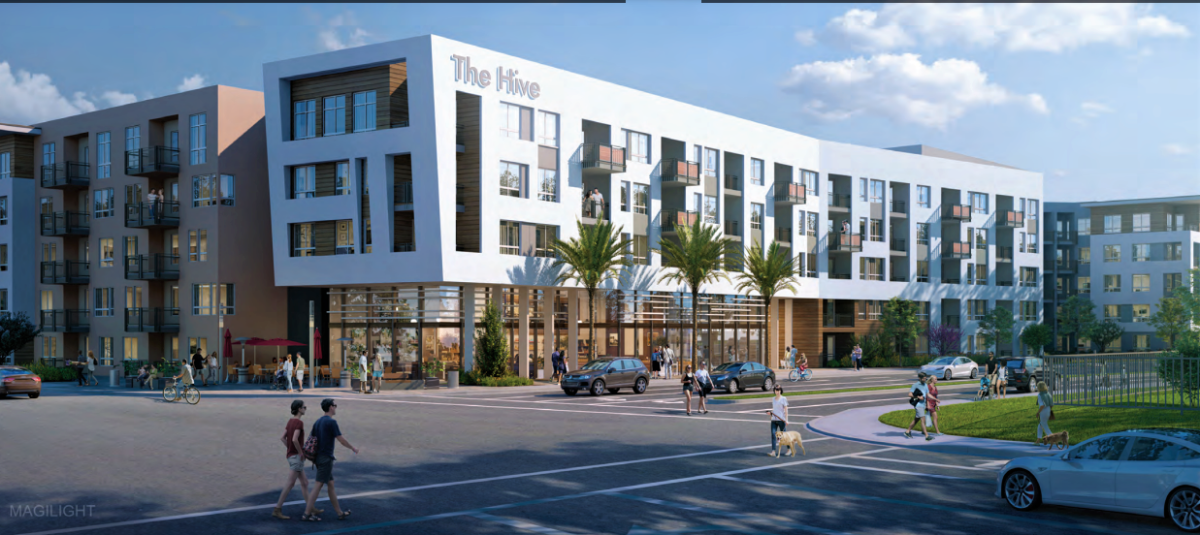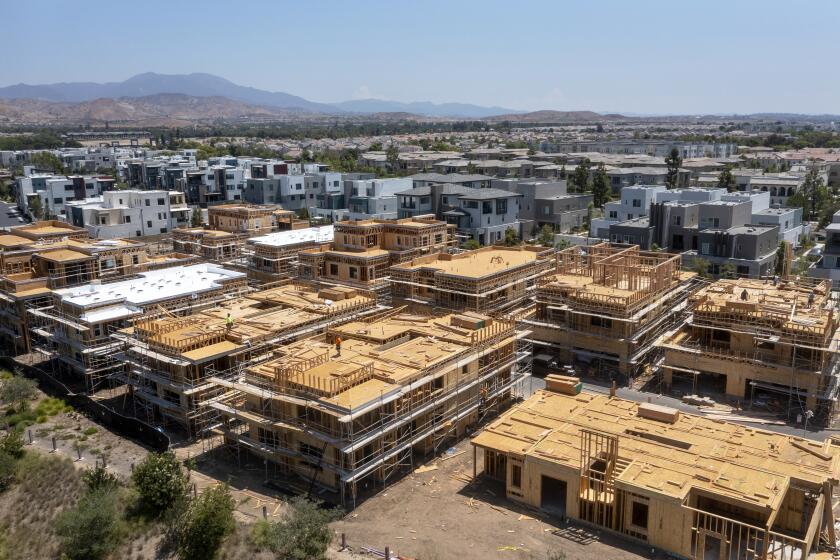Costa Mesa council begins to lay foundation for affordable housing ordinance

- Share via
In Costa Mesa — where the average cost of a two-bedroom rental rose from $1,630 in 2012 to roughly $2,850 in 2022 — residents and city leaders agree more affordable housing is needed.
But exactly how to get there remains to be seen, as officials continue to work out the details of an inclusionary housing ordinance that would potentially require new residential developments to set aside units for low-income tenants or pay in-lieu fees to fund other housing projects.
For the record:
10:21 a.m. Jan. 24, 2024The caption to the photo accompanying this article has been corrected to state the proposed project will be subject to the inclusionary housing ordinance if that ordinance is approved by the Costa Mesa City Council. The story also reported a date for the ordinance’s second reading that has since been changed.
The city’s planning commission recently recommended a draft ordinance for consideration by the Costa Mesa City Council, which considered the matter last week.
Commissioners in December suggested affordability requirements be applied to only projects of 2 acres or more that contain at least 60 dwelling units per acre, meaning it would take 120 units to trigger the provisions of the ordinance.
The commission further recommended projects with a density of 60 or more units-per-acre would need to dedicate either 10% of the total units for low-income tenants earning 80% or less of Orange County’s $127,800 area median income or 5% for very-low income tenants who earn 50% of that income level.
Several affordable housing advocates on Tuesday decried the 2-acre trigger, claiming it set the bar for affordability too high.
“[You’d be] making it easier to build market-rate units and providing little encouragement to create affordability,” said Dianne Russell, a former planning commissioner and member of the Costa Mesa Affordable Housing Coalition. “If you support it, you’re making a clear choice for market-rate developers over the people who trusted you and elected you.”
Other advocates, however, said while they supported an affordability program, creating more market-rate housing would be crucial to improving the city’s overall inventory, which benefits renters at all levels.
An ordinance approved by planning commissioners Monday will soon make its way to the Costa Mesa City Council. But whether the law will alleviate or worsen the city’s housing crisis remains to be seen.
Consultant Kathe Head, president of Los Angeles-based firm Keyser Marston Associates, said Costa Mesa hopes to incentivize developers to build more affordable units by rezoning certain areas and corridors in town, under the voter-backed Measure K, to allow for much higher densities and, consequently, higher land values.
From the enhanced value created, an inclusionary ordinance would then “claw back” part of a project’s profitability by imposing affordability requirements, creating a situation in which both land holders and the city benefit.
“Instead of 100% of that value inuring to the property owner, we’re saying that as one of the requirements of this rezoning, this benefit, we’re going to ask you to provide affordable housing,” Head explained.
Builders and developers however, maintained such an ordinance would simply halt building altogether. Tim O’Brien, a senior managing director at Legacy Partners, urged city leaders to take a conservative approach to establishing set-aside requirements.
“If it’s too low, you’ll [still] have a production of units,” he said. “If it’s too high, it will be another five to seven years of no housing, period.”
Councilwoman Andrea Marr said getting the support of the development community in helping draft an ordinance has been difficult.
“We’ve talked about upzoning, we’ve talked about adding incentives and adding more value to properties, and that’s still not considered an incentive by the definition of some folks,” Marr said.
“The notion we’re impeding development, to me, is just absurd. This council has done more to create housing than certainly the last three councils before it,” she continued. “And, yet, maybe we’re not threading the needle quite right. If I sound frustrated, it’s because I am.”
Marr recommended removing the planning commission’s 2-acre trigger, finding that would apply to fewer than 11% of the parcels in Costa Mesa being rezoned under Measure K. She instead suggested a 15-unit trigger for apartments or home ownership projects, a figure closer to the 10 units initially recommended by staff.
She further suggested developers of projects from 15 to 50 units be allowed to decide whether to produce affordable units or pay an in-lieu fee to fund other citywide housing initiatives. Projects of 50 units or more would be required to produce actual housing.
For affordability set-asides, Marr proposed projects with a density of 60 or more units per acre be mandated to set aside 11% of units for low-income tenants or 7% for those deemed very-low income. Projects under 60 units-per-acre would have a choice between designating 6% as low-income and 4% as very low-income units.
Development agreements for large-scale projects would be exempt from the mandates of the ordinance in Marr’s proposal, so long as an applicant agrees to provide an equivalent community benefit. The builders of home ownership projects, such as condominiums, could pay in-lieu fees instead of building affordable units, if they chose.
Although council members voted 4-2 to move ahead with Marr’s proposal (with Mayor Pro Tem Jeffrey Harlan and Councilman Manuel Chavez opposed and Don Harper absent), they agreed more consideration, and information on an in-lieu fee structure, would be forthcoming on a second reading of the item.
“This is just a first reading,” said Councilman Loren Gameros as the meeting stretched past midnight. “We’re not running with any of this — this is not going to make or break any sort of development agreement or change the individual value of someone’s house.”
All the latest on Orange County from Orange County.
Get our free TimesOC newsletter.
You may occasionally receive promotional content from the Daily Pilot.





